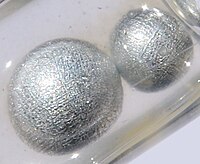
Photo from wikipedia
Background Systemic sclerosis (SSc) is a chronic connective tissue disorder characterized by microvascular injury, fibrosis and autoimmunity that affects the skin and internal organs. The short-term activation of peripheral blood… Click to show full abstract
Background Systemic sclerosis (SSc) is a chronic connective tissue disorder characterized by microvascular injury, fibrosis and autoimmunity that affects the skin and internal organs. The short-term activation of peripheral blood T lymphocytes plays a crucial role in initiating and maintaining the chronic inflammation. The transient increase of the cytoplasmic free calcium level plays a key role in the process of lymphocyte activation. Kv1.3 and IKCa1 potassium channels are important regulators of the maintenance of calcium influx during lymphocyte activation. The influx of calcium is maintained by the function of potassium channels that conserve the electrochemical potential gradient via the efflux of potassium from the cytoplasm. Recent reports raised the notion that the inhibition of lymphocyte potassium channels, especially that of the Kv1.3 channel would be an straightforward solution for specific immunosuppression in autoimmune disorders. Furthermore, our previous studies described an alteration of the short-term activation of peripheral lymphocytes in rheumatoid arthritis and primary Sjögren's syndrome (pSS), and the overexpression of Kv1.3 channels in pSS. Objectives Therefore, in this study we aimed to characterize the effects of lymphocyte potassium channel inhibition on short-term peripheral blood T lymphocyte activation in major lymphocyte subsets in SSc. Methods We enrolled 12 healthy individuals and 16 SSc patients. We evaluated calcium influx kinetics following activation in CD4, Th1, Th2 and CD8 cells applying a novel kinetic flow cytometry approach. We assessed the sensitivity of the above subsets to specific inhibition of the Kv1.3 and IKCa1 potassium channels. We also assessed the Kv1.3 expression on lymphocytes. Results We observed increased parameters of calcium influx in CD8+ lymphocytes' as compared with Th1 cells in SSc. However, the activation of CD8+ cells was lower in SSc compared to healthy controls. Moreover, activation of Th1 lymphocytes was slower in SSc than in healthy controls. The inhibition of IKCa1 potassium channel decreased the activation of CD8+ lymphocytes in healthy controls and the activation of Th1 cells in SSc. The inhibition of Kv1.3 channel modified the dynamics of activation of Th1 and Th2 lymphocytes in SSc. Conclusions The altered function of CD8+ cells and the specific inhibition of potassium channels seem to be a consequence of altered calcium influx kinetics in SSc, distinguishing it both from healthy controls and other autoimmune diseases. Acknowledgements Attila Balog and Gergely Toldi were supported by the János Bolyai Scholarship. Gergely Toldi is an International Society for the Advanecement of Cytometry (ISAC) Scholar. Disclosure of Interest None declared
Journal Title: Annals of the Rheumatic Diseases
Year Published: 2017
Link to full text (if available)
Share on Social Media: Sign Up to like & get
recommendations!